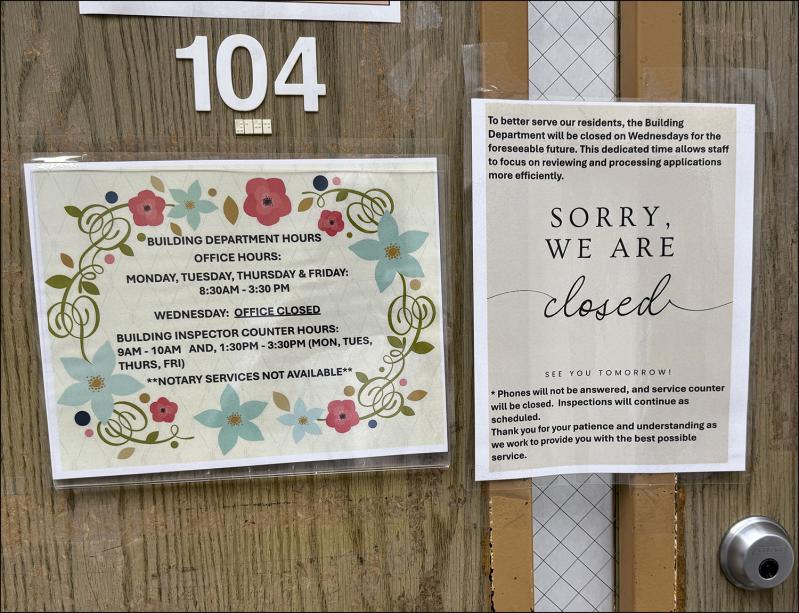Last week, a notice on the East Hampton Town website alerted visitors that “To better serve our residents, the Building Department office will be closed to the public on Wednesdays.”
In other words, to better serve the public it will be closed to the public.
Phones will not be answered, and the service desk will be closed.
Building Department employees will still be at work behind the closed doors, reviewing and processing applications to attack a growing backlog.
First thing this week, Town Supervisor Kathee Burke-Gonzalez issued a press release seeking to reassure residents. She announced that four new positions have been created in the department: two building plans examiners, one building inspector, and one account clerk.
Those positions have yet to be filled.
“The addition of dedicated plans examiners is especially important, as they will focus on application review and compliance, giving building inspectors more time to conduct field inspections,” read the release. “This division of responsibilities is expected to meaningfully reduce delays and improve turnaround times.”
Frustration over the state of affairs at the Building Department was on display at last Thursday’s town board meeting.
“Our Building Department appears understaffed relative to our neighbors in Southampton, Riverhead, Southold, and the village,” John Cinelli, a Springs resident, told the board, during the public portion.
“The village has three building inspectors, including our former chief inspector, and the town also has three building inspectors. Yet, the town has over 12 times more housing units than East Hampton Village. When compared to Riverhead, Southold, and Southampton, our three inspectors cover about twice as many housing units as the inspectors in those towns.”
Mr. Cinelli described his own delays: a month to update a certificate of occupancy, another month for a rental registry application, and more than three months waiting for a building permit.
“They’re obviously overwhelmed,” he said. “They recently told us they were working on applications filed in February. That implies at least a six-month processing time. To me, that’s unacceptable.”
Closing the office to the public on Wednesday “feels like a Band-Aid on a gunshot wound,” he added, while admitting it was a “step in the right direction.”
At the same meeting, the town board voted to extend Ann Glennon’s appointment as temporary principal office assistant for another month, to Sept. 30.
Ms. Glennon served as principal building inspector before Joseph Palermo, who left this spring to become chief building inspector for East Hampton Village. Since Mr. Palermo’s departure, the town’s Building Department has had no permanent head.
Additionally, rumors have swirled regarding possible investigations at the department, none of which could be substantiated.
In April, the town board suspended “employee 1254” for 30 days without pay but gave scant details. A Freedom of Information Law request revealed that Evelyn Calderon, then principal office assistant, was the suspended employee.
Patrick Derenze, the town’s public information officer, said recently in a text that Ms. Calderon “remains on administrative leave with pay pending a hearing.”
Before she can receive a hearing, however, the town board needs to appoint a hearing officer. Mr. Derenze gave no timeline for that action.
Then, in August, Justin Winter, a building inspector, resigned. Mr. Derenze said the town would not comment on a personnel matter.
Tania Lopez, the director of communications for Suffolk County District Attorney Ray Tierney, said in the spring that “We do not confirm or deny that we are launching investigations. That’s our policy.”
She did not return a follow-up request for information this week.
Adding to the turmoil, Jon Tarbet, a local attorney, filed a lawsuit this summer challenging a new town code provision requiring home sellers “to submit to a warrantless search of their home, or risk being charged with a misdemeanor, fines and/or imprisonment.”
Mr. Tarbet argues the code “has caused chaos in the local real estate market” and claimed updated certificates of occupancy now take up to four months to obtain. The town has moved to dismiss the case.
As part of that motion, it was revealed in an affidavit that Allison McDougall, an administrative assistant, has been serving as acting principal building inspector. Multiple sources confirmed she has been signing off on building plans and certificates of occupancy.
Mr. Derenze defended the arrangement, saying Ms. McDougall is “code certified” by New York State and that a town board resolution naming her acting principal building inspector was not needed under her Civil Service contract. She receives “out-of-title pay” for her work in that role, which is 15 percent more than her usual salary.
The judge has yet to rule on the town’s dismissal motion.
According to the town’s website, the Building Department, including the suspended Ms. Calderon, at present has a staff of seven; three building inspectors, two office assistants, and one administrative assistant.
Their days were busy even before they lost Mr. Palermo, Ms. Calderon, and Mr. Winter. The doors open at 8:30 a.m., with phones already ringing.
At 9 a.m. one inspector is available at the counter for walk-in questions but by 10, the inspectors leave for the field.
They’re in a different hamlet each day of the week. When they return from the field, they’re back answering phones and taking questions at the counter.
Even simple permits, such as those for pools, require inspectors to verify surveys, setbacks, and code compliance. Full houses are more complex, and properties in Federal Emergency Management Agency-designated areas add another layer of difficulty. Inspectors also conduct final checks before issuing certificates of occupancy.
Despite the challenges, the department’s work is lucrative. Mr. Derenze said that in 2024, it generated nearly $3.4 million in fees. Year to date, it has generated nearly $2.54 million, 96 percent of its projected 2025 revenue.




